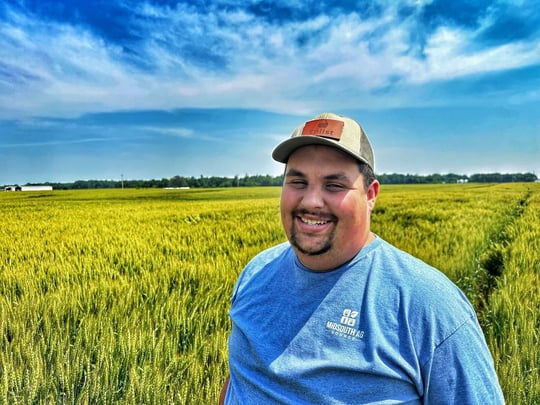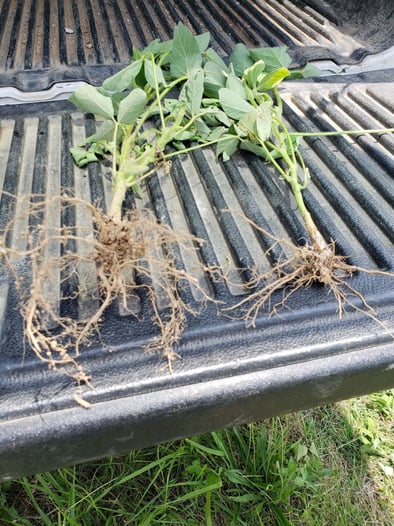In Austin Leach’s part of the country, west Tennessee, drought has been a real issue for the past few years. The lack of precipitation impacts crops before they can even sprout, and stunted plant emergence has made farming increasingly difficult for the farmers Austin serves through his agribusiness, MidSouth Ag Source. In a recent CropLife webinar, Austin shared how partnering with Indigo is giving him new tools and opportunities to help local farms stay profitable, despite the ongoing drought.
How did you come to start using biologicals?
As a small retailer covering areas through the mid south, we were really looking at how we can offer more treatment options to our farmers. We've always been big on treatments and trying to stay on top of boosting nutrition, boosting root mass. We thought that biologicals would be a good fit.
We started trying out Indigo’s biotrinsic® treatments in a “walk before you try” kind of deal—and we've had some really good results. In my area, we mainly grow beans and soybeans. You get a little bit west of me and that’s when the cotton hits. What were the initial results?
What were the initial results?
In the photos I’ve shared above, you can see the effects of the biologicals and inoculants—tremendous success with the root mass system and the vegetative flower state. We had roots measuring up to 16 inches long per plant, and the plants were about 14 inches tall. So we’re definitely available to get into the nutrients and into the water aqueducts in the soil.
What we're also seeing a lot more nitrogen nodulation on the root system. I've actually had a lot of customers come back to do side-by-side comparisons. We're definitely seeing the plants picking up more nitrogen for the soil and expanding on that front as well.
The biggest difference we've seen with these products is good growing conditions. No one can say the last couple years were pretty good. Last year was a near disaster on a lot of farms. We suffered a pretty extreme drought. But last year also was probably our biggest increase in biotrinsic® sales and people actually seeing what the seed treatments can do. On almost all of our double crop soybeans, we had zero replants. For other retailers in the county, a lot of beans didn't come up—didn't matter what brand or treatment it was. We had a lighter stand, but we had an 80% success rate with coming up. The direct tie to that was the biotrinsic® treatment. Farmers really noticed the results, and they're really asking for it this year. So we've had really good success after that drought year.
I know you said it's a “crawl before you walk” deal, but what truly pushed you to try to start looking at biologicals? What truly got you looking in that direction?
Everyone in the industry has heard of biologicals, and there's definitely benefits out there. But it's a buzzword. My main focus was to find a treatment that would stimulate root growth and root mass and help with emergence. That's why I started looking into biologicals. The standard metalaxyl and carboxin treatments are great for protecting the seed, but I was trying to get the seed out of the ground faster, with a bigger root mass for a more even emergence.
How have you introduced it to growers, to get past the kind of “buzzword” impression and share the benefits with them?
To be honest, we’ve had really good luck with it by showing them the data, showing them the root masses in side-by-side trials. There's a lot of “snake oil and pond water” out there, as my growers like to call it. But with that being said, it's a pretty easy sell when you're showing them the numbers. And with Indigo's tremendous support for trials, the proof is in the pudding—and it looks very good.
Let’s talk about the “crawl before you walk” approach and what that has looked like with your farmers.
We started with one product on one crop, biotrinsic® M34 on soybeans. It went really well. We did trials with wheat, as well. With corn, it’s more emotional. Farmers are typically more hesitant to test their corn with new treatments, but other companies are coming out right now with nitrogen fixation treatments. The industry seems to be looking into how to improve corn, so we’ve had a lot of curiosity from farmers, more than we usually do on corn, for a product that's going to help with nitrogen capturization. When you show them the data, it more or less sells itself. In corn, as more and more companies get behind it–and with rising nitrogen costs–we're seeing a lot of farmers look at how they can capture some additional nitrogen with a low investment in trialing biologicals. Talking about competition, how does carrying biotrinsic® position you in the market as far as competitive and something possibly your competition doesn't offer?
Talking about competition, how does carrying biotrinsic® position you in the market as far as competitive and something possibly your competition doesn't offer?
I think biotrinsic® is something that gives you the leading edge. It is definitely something that makes us stand out from other retailers, with options that others aren't offering. And you go to a farm and say, "Hey, I can protect that seed from the beginning with insecticide, fungicides, and with an inoculant to get it out of the ground, and then a biological to follow with a bigger root system that's going to take up more nutrients, take up more water. Basically we're going to get your plant off to the best start." The farmers are very receptive to that. As far as on the competition side, I think it's been very competitive in the market as far as the price of the product for the ROI that you receive.
Let’s shift the discussion to Indigo’s carbon program. You have a fairly good-sized footprint in the entire mid south, and you even go a little bit farther north. What made you consider offering a carbon program to your growers?
Carbon is definitely the buzzword. Everyone knows the word carbon, but that's about as far as their knowledge goes. And I'll be honest, I was one of them before I tied on with y'all. We here at Midsouth Ag are trying to do anything new and innovative. Carbon programs are not new, but the carbon market has definitely grown by leaps and bounds. And then at the end of the day, I feel like it's going to benefit the farmer on multiple fronts on his farm—it's cash inflow, soil fertility, and weed suppression. And then on top of it, you might get a little extra money for changing a small practice. I really think there's a very good benefit to it. There's not going to have to be a huge practice change to do this and to get the benefit, to get the extra money and the added benefit on their farm.
Did you look at any other programs before deciding on Indigo's?
Yes, we did. We actually looked at two competitors before Indigo. I'd say probably the biggest thing that was intriguing to us with Indigo, was the looser contract for the grower. It doesn't tie down the grower or the retailer. Indigo has the simplest program for a retailer and the simplest program for your farmer to get enrolled to start getting paid.
Why is it simpler for farmers? Can you give a few details as to what you mean by that compared to a competitor.
We've looked at a few other programs and there were very hardline contracts. With Indigo, it is less time constraining, less investment to get started, and then not to mention you provide support and staff to help out with training, which I really liked and know the growers appreciate.
What does having the carbon program offering for your growers mean to your business and your relationship with your customers?
I don't think it's a thing that's going to make or break a retailer, but I do think it benefits the grower. I's going to help their soil, help their weeds. There's a lot more than just money we're looking at in terms of cost-per-acre on the grower side. On the retailer side, you're going to be able to expand your portfolio, have another conversation with people, bring something different to the table and benefit if a farmer chooses to incorporate cover crops and the like. This is a new opportunity, this is how we can improve your farm and you can even get paid for it. In my opinion, Indigo’s carbon program is one of the most extensive, well-organized carbon programs on the market. At the end of the day, if you look into the carbon program, I really feel it's a win-win for the retailer and it's a win-win for the farmer.
Individual results will vary based on a large number of factors. See program agreement for additional payment terms, conditions and limitations.
Indigo and MidSouth Ag Source are separate, independent parties. MidSouth Ag Source is not an agent or legal partner of Indigo.




